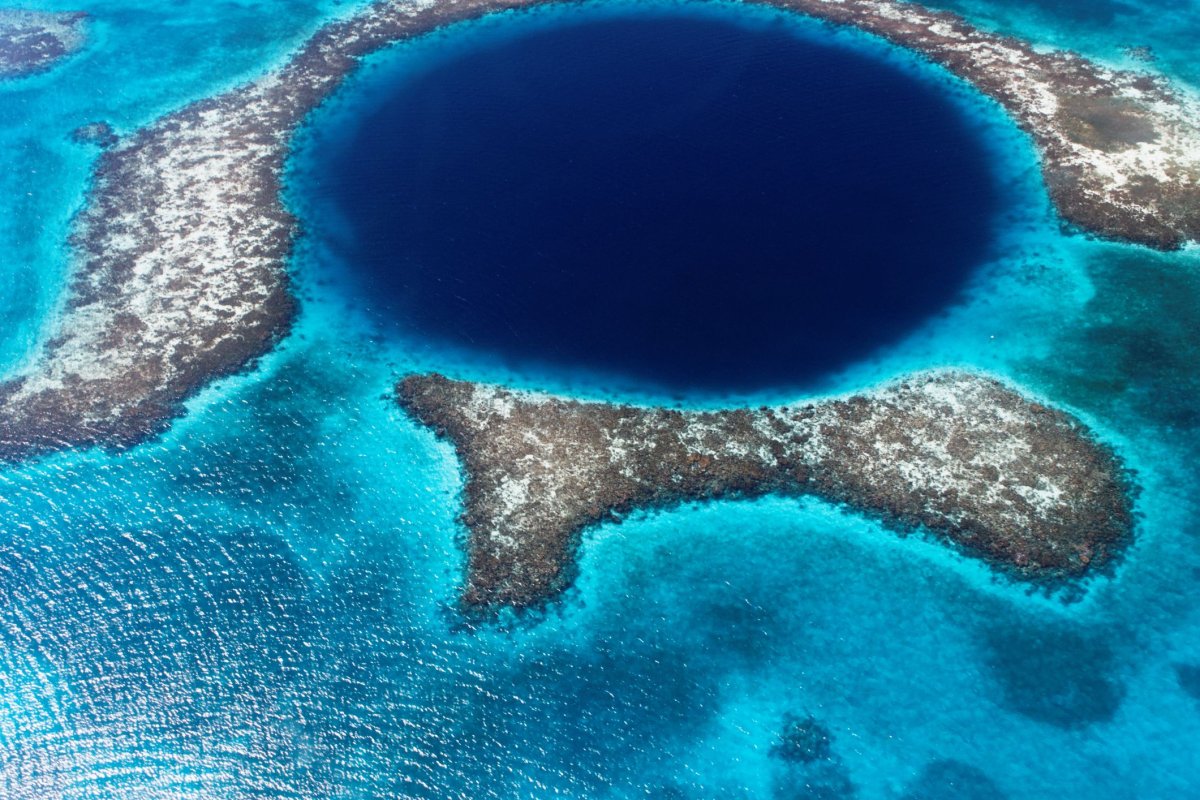Richard Branson has found plastic at the bottom of the world's biggest ocean sinkhole.
The billionaire dove into the abyss with Fabien Cousteau, the grandson of French explorer Jacques Cousteau, and National Geographic explorer Erika Bergman at the end of last year. In a blog post about the trip, he has said the discovery of bottles at the bottom of the Great Blue Hole shows the great need to "get rid of single use plastic," adding that it has become the "scourge of the ocean."
Read more: A giant underwater sinkhole has just been discovered in the Great Barrier Reef
The Great Blue Hole, off the coast of Belize, is almost 1,000 feet across and 410 feet deep. It is part of the UNESCO World Heritage Site the Belize Barrier Reef Reserve System (BBRRS). It is at the center of an atoll called the Lighthouse Reef.
The Great Blue Hole formed as a limestone cave hundreds of thousands of years ago, when sea levels were far lower. At the end of the last ice age, sea levels rose by around 300 feet, submerging the cave to become the natural wonder it is today. The site became famous in 1971 when Jacques Cousteau explored it, declaring it one of the top five scuba diving sites in the world.
Branson went to the Great Blue Hole last month and broadcast the dive on the Discovery Channel. In a subsequent blog post, Branson wrote: "We travelled about 10 minutes in the submarine into the Blue Hole and then started edging down the wall of the hole. The first thing we came across was a massive wall of giant stalactites, which were breathtakingly beautiful.
"The Blue Hole is made of a complex system of caves that once formed on dry land. It is proof of how oceans can rise quickly and catastrophically. Sea levels were once hundreds of feet lower. 10,000 years ago the sea level rose by about 300 feet when a lot of ice melted around the world. At 300 feet down you could see the change in the rock where it used to be land and turned into sea. It was one of the starkest reminders of the danger of climate change I've ever seen."
Continuing, he said the three divers eventually got to the thick layer of hydrogen sulphide—a colourless, toxic gas that has formed over centuries. Below this, the team found creatures that had fallen into the hole and died after running out of oxygen.
"As for the mythical monsters of the deep? Well, the real monsters facing the ocean are climate change—and plastic," Branson wrote. "Sadly, we saw plastic bottles at the bottom of the hole, which is a real scourge of the ocean. We've all got to get rid of single-use plastic."
The scientific team working with Branson will now be producing a 3D view of the Great Blue hole. They are also involved in Ocean Unite—a conservation group that hopes to protect 30 percent of the ocean by 2030.
The divers' finding that plastic has entered the Great Blue Hole should not come as a huge surprise. Mass production of plastic started in the 1940s and 50s. In 2017, scientists at the University of Georgia announced around 8.3 billion tons of plastic had been made—most of which has been discarded. Plastic has been found in deep sea sediments three miles below the surface of the ocean. It has been found in Arctic sea ice and on Swiss mountains.
More recently, scientists announced plastic particles can be found in human feces across the globe. Philipp Schwabl, lead author of the research, said: "It is likely that the amount of plastic contamination may rise further if mankind does not change the current situation."

Uncommon Knowledge
Newsweek is committed to challenging conventional wisdom and finding connections in the search for common ground.
Newsweek is committed to challenging conventional wisdom and finding connections in the search for common ground.
About the writer
Hannah Osborne is Nesweek's Science Editor, based in London, UK. Hannah joined Newsweek in 2017 from IBTimes UK. She is ... Read more
To read how Newsweek uses AI as a newsroom tool, Click here.








